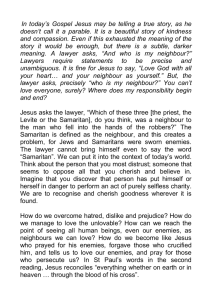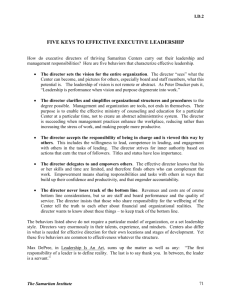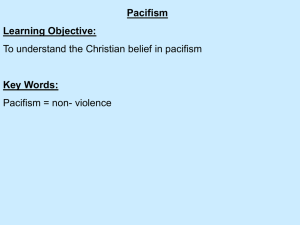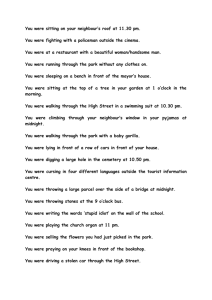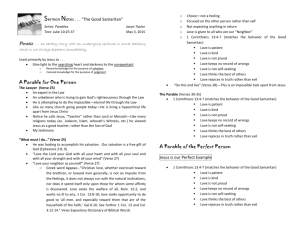The Parable of the Good Samaritan
advertisement
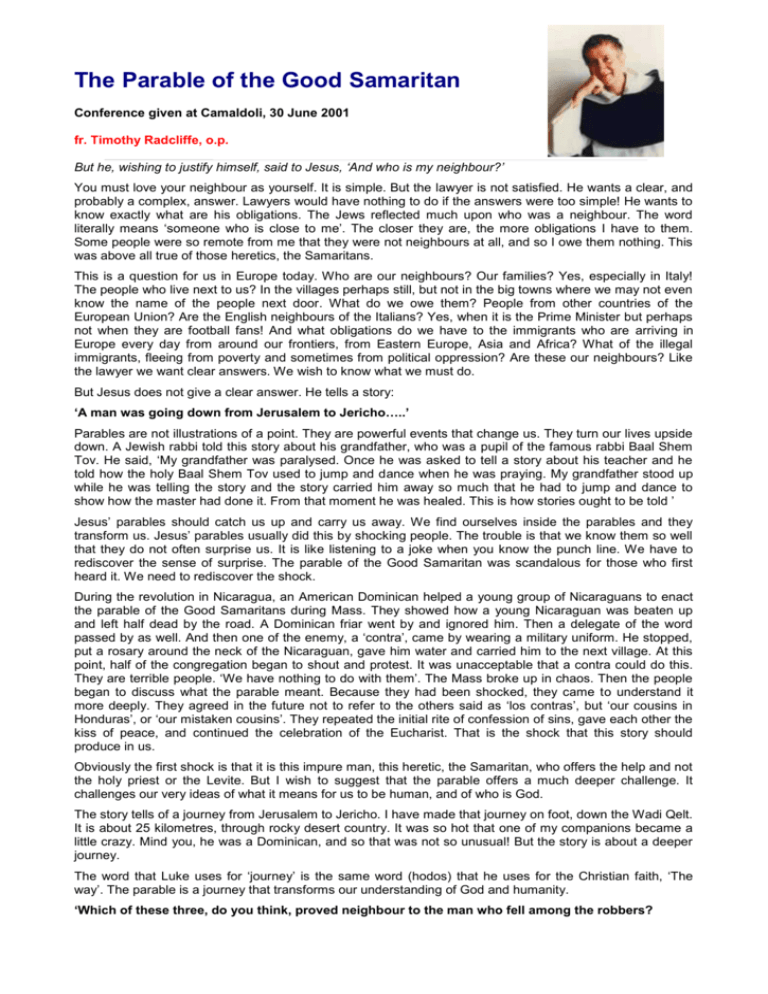
The Parable of the Good Samaritan Conference given at Camaldoli, 30 June 2001 fr. Timothy Radcliffe, o.p. But he, wishing to justify himself, said to Jesus, ‘And who is my neighbour?’ You must love your neighbour as yourself. It is simple. But the lawyer is not satisfied. He wants a clear, and probably a complex, answer. Lawyers would have nothing to do if the answers were too simple! He wants to know exactly what are his obligations. The Jews reflected much upon who was a neighbour. The word literally means ‘someone who is close to me’. The closer they are, the more obligations I have to them. Some people were so remote from me that they were not neighbours at all, and so I owe them nothing. This was above all true of those heretics, the Samaritans. This is a question for us in Europe today. Who are our neighbours? Our families? Yes, especially in Italy! The people who live next to us? In the villages perhaps still, but not in the big towns where we may not even know the name of the people next door. What do we owe them? People from other countries of the European Union? Are the English neighbours of the Italians? Yes, when it is the Prime Minister but perhaps not when they are football fans! And what obligations do we have to the immigrants who are arriving in Europe every day from around our frontiers, from Eastern Europe, Asia and Africa? What of the illegal immigrants, fleeing from poverty and sometimes from political oppression? Are these our neighbours? Like the lawyer we want clear answers. We wish to know what we must do. But Jesus does not give a clear answer. He tells a story: ‘A man was going down from Jerusalem to Jericho…..’ Parables are not illustrations of a point. They are powerful events that change us. They turn our lives upside down. A Jewish rabbi told this story about his grandfather, who was a pupil of the famous rabbi Baal Shem Tov. He said, ‘My grandfather was paralysed. Once he was asked to tell a story about his teacher and he told how the holy Baal Shem Tov used to jump and dance when he was praying. My grandfather stood up while he was telling the story and the story carried him away so much that he had to jump and dance to show how the master had done it. From that moment he was healed. This is how stories ought to be told ’ Jesus’ parables should catch us up and carry us away. We find ourselves inside the parables and they transform us. Jesus’ parables usually did this by shocking people. The trouble is that we know them so well that they do not often surprise us. It is like listening to a joke when you know the punch line. We have to rediscover the sense of surprise. The parable of the Good Samaritan was scandalous for those who first heard it. We need to rediscover the shock. During the revolution in Nicaragua, an American Dominican helped a young group of Nicaraguans to enact the parable of the Good Samaritans during Mass. They showed how a young Nicaraguan was beaten up and left half dead by the road. A Dominican friar went by and ignored him. Then a delegate of the word passed by as well. And then one of the enemy, a ‘contra’, came by wearing a military uniform. He stopped, put a rosary around the neck of the Nicaraguan, gave him water and carried him to the next village. At this point, half of the congregation began to shout and protest. It was unacceptable that a contra could do this. They are terrible people. ‘We have nothing to do with them’. The Mass broke up in chaos. Then the people began to discuss what the parable meant. Because they had been shocked, they came to understand it more deeply. They agreed in the future not to refer to the others said as ‘los contras’, but ‘our cousins in Honduras’, or ‘our mistaken cousins’. They repeated the initial rite of confession of sins, gave each other the kiss of peace, and continued the celebration of the Eucharist. That is the shock that this story should produce in us. Obviously the first shock is that it is this impure man, this heretic, the Samaritan, who offers the help and not the holy priest or the Levite. But I wish to suggest that the parable offers a much deeper challenge. It challenges our very ideas of what it means for us to be human, and of who is God. The story tells of a journey from Jerusalem to Jericho. I have made that journey on foot, down the Wadi Qelt. It is about 25 kilometres, through rocky desert country. It was so hot that one of my companions became a little crazy. Mind you, he was a Dominican, and so that was not so unusual! But the story is about a deeper journey. The word that Luke uses for ‘journey’ is the same word (hodos) that he uses for the Christian faith, ‘The way’. The parable is a journey that transforms our understanding of God and humanity. ‘Which of these three, do you think, proved neighbour to the man who fell among the robbers? The lawyer asks ‘Who is my neighbour?’ At the end Jesus poses a different question: ‘Which of these three proved neighbour to the man who fell among robbers?’ The lawyer’s question puts himself at the centre. Who is his neighbour? But the parable transforms the question: it is the wounded man who is the centre now. Who was neighbour to him? This is the most radical journey that every human being has to make, the liberation from egoism. We begin this journey as a baby. The new-born baby is the centre of its own world. Growing up is the slow discovery there are other people and they do not exist just to do one’s will. Behind the breast there is a mother. One becomes fully human as one learns to surrender the centre to others. For every one of us the biggest challenge of our lives is to cease to be the centre of the world. This is a truth that I know intellectually, but which is so difficult to achieve. I think that it is especially difficult in contemporary society. Modernity has consecrated the image of the human being as essentially solitary, detached from other people, free from obligation, disengaged. This is the ego of the consumerist society. In Italy you have in some ways perhaps preserved an older and more traditional view of the human being, thanks be to God. But everywhere in the global village we can see signs of the triumph of the ‘Me generation’, the tyranny of the ego. How can we learn to let go and give others the centre? A Samaritan, as he journeyed, came to where he (the wounded man) was and when he saw him he had compassion. The word translated by ‘to have compassion’ is one of the most important in the New Testament. It means to be touched in the centre of one’s being, in one’s very bowels. It is the shock of the awareness of another. An experiment was carried out in New York. A group of seminarians were asked to prepare a homily on the parable of the Good Samaritan, as part of learning how to preach. They prepared their texts in one building and then had to walk down the street to a studio, where it was recorded on video. An actor was dressed up as a wounded man lying on the pavement covered with blood, begging for help. 80% of them walked passed him and did not even see him. They studied the parable and even composed beautiful words about it, but they could walk by the wounded man and ignore him. How can we open ourselves to the other? For most human beings this utter awareness of the other occurs most dramatically when we fall in love. Iris Murdoch, the English philosopher, said that falling in love is ‘for many people the most extraordinary and revealing experience of their lives, whereby the centre of significance is suddenly ripped out of the self, and the dreamy ego is shocked into an awareness of an entirely separate reality.’ When we fall in love, we cease, at least from time to time, to be the centre of the universe, and let another take that place. We cease to be the sun and become the moon. But this does not really answer our question. We cannot fall in love with everyone! And the Good Samaritan did not fall in love with the wounded man! So the question is this: How can we let ourselves be touched by the other people whom we hardly know? The Samaritan is touched because he sees the wounded man. The priest and the Levite also see him, but they see not a person needing help but a possible source of impurity. We shall come back to them later. The first challenge is to open one’s eyes to see. Just before the parable of the Good Samaritan, Jesus turns to the disciples and says, ‘Blessed are the eyes which see what you see’ (10.23). When I was a student at Oxford, we decided to open up a hostel for the tramps. The streets of Oxford are filled with tramps, because the tourists are generous. We decided that the first step was to organise a survey at night to see how many tramps were sleeping outside. Six groups of students went to visit all the parts of the city. We met at 5am, and we had not found a single tramp asleep! They were out there somewhere, but we did not know where to look! They were invisible to our eyes! Every society makes some people visible and others disappear. In our society politicians and film stars, singers and footballers are all visible. They appear in public spaces and on the billboards and the Television screens. But we make the poor invisible. They disappear from the electoral lists. They have neither a voice nor a face. And illegal immigrants cannot afford to be visible. If they do not have papers, then they must become inconspicuous. They must learn the art of camouflage. When the Pope visited the Dominican Republic, the government built a wall along the route from the airport to the city centre, to stop him seeing the slums in which the poor lived. The people call it ‘the wall of shame’. Do we dare to see our poor and be touched by them? What are the walls of shame that we construct in our society to hide the poor? And the Samaritan ‘went to him and bound up his wounds, pouring on oil and wine; then he set him on his own beast and brought him to an inn, and took care of him. And the next day he took out two denarii and gave them to the innkeeper, saying, “Take care of him; and whatever more you spend, I will repay you when I come back.”’ Being touched is not enough. When I go to see films, I get very involved and weep easily. My friends are embarrassed to go to the cinema with me! But when the film finishes and I go and have a good pizza, then I quickly forget. We all suffer from ‘compassion fatigue’. We see on the screens of our televisions thousands of images of wounded and dying men, women and children lying by the roadside. How can we react to them all? When I was writing this lecture it was exactly at this point that a Dominican Bishop from Guatemala came to see me. He described the poverty of the people, the suffering caused by hurricanes and earthquakes, the corruption of the government, and the persecution of the Church. I was extremely moved. But when he left I went on preparing my lecture on the Good Samaritan! It is much easier to write lectures about parables than to live them. As George Bernard Shaw (I think) said, ‘Those who can, do; those who cannot, teach’! The compassion of the Samaritan upsets his plans. He had prepared himself for his journey, with food, drink and money. Now these are used for a purpose that he had not imagined. Two denarii was a lot of money, enough to pay for more than three weeks board and lodging. He even gives what he does not yet have, the money that he will hope to earn in Jericho. He takes the risk of a promise that is open, without predetermined limits. When the lawyer asks, ‘Who is my neighbour?’ he wishes to define his obligations. He wishes to know in advance what he must do and what he need not do. But the response of the Samaritan leads him into unknown territory. He cannot know how much the innkeeper will ask from him. There is an old joke: ‘If you want to make God laugh, then tell him your plans’. True compassion upsets our plans, and leads us in unexpected directions. If we dare to see the poor, the wounded, the strangers in our midst, then who knows what will be the consequences for us? ‘ “Which of these three, do you think, proved neighbour to the man who fell among thieves?” He said “The one who showed mercy on him”. And Jesus said to him “Go and do likewise”’. We have already seen that the lawyer asks a question that makes himself the centre, and Jesus replies with a question which makes the other person the centre. But there is another change. The lawyer asks who is his neighbour. The assumption is that we already have neighbours, but we must define who they are. But Jesus replies by asking who became a neighbour to the wounded man. The Samaritan makes himself a neighbour to that man. He creates a relationship that did not exist before. Europe is haunted these days by the fear of the other. Neo-Nazi groups appear to be growing in Germany. In England recently there have been race riots in the northern towns of Oldham and Leeds. Europe feels under threat from foreigners. Within every society, there is fear of those who are different, who have different religions, different colours of skin, who dress differently, speak different languages. The invitation of the parable is to make them neighbours. Helder Camera, the Archbishop of Recife in Brazil, was often accused of being a communist because of his concern for the poor who live in the favellas on the hills around the city. He said: ‘If I do not go up the hills into their favellas to greet them as my brothers and sisters, then they will come from the hills into the cities with flags and guns’. ‘Go and do likewise’. These words are an invitation to construct a society that does not yet exist. A Christian politics is more than the management of society and the regulation of competing interests. Una ‘coscienza cristiana e nuove responsibilità della politica’ is always geared to the future. It is a stretching out towards a community in which the alien, the stranger, the poor are truly our neighbours. It points towards the Kingdom. Unlike communism, we Christians do not believe that we can ourselves build the Kingdom. The Kingdom will come as a gift that is unmerited and beyond our imagination. But our politics, in reaching out to communion with the other, opens our hands to receive that gift. Politics has been defined as ‘the art of the possible’. Christian politics is marked by the hope for what many would consider impossible. We take the risk of stretching forward for a communion that is beyond our grasp. Christian politics is the art of the impossible. Ultimately, this means losing the small identities that separate us from each other. The parable tells of our journey that transforms the identities of the participants. The man who is attacked by robbers is simply called ‘a certain man’. It is not said if he is a Jew or Samaritan, an English man or an Italian. He is each of us, every human being. And when Jesus asks who became the neighbour to the wounded man, then the lawyer does not reply ‘The Samaritan’. He just says, ‘The one who showed him mercy’. The Samaritan too has been liberated from that small identity as a heretic. The story begins as a story of Jews and Samaritans and becomes the story of two human beings. The ones who retain their original identity are those who just walk by, the priest and the Levite. They miss the opportunity to discover a new way of being human. They walk by but they are stuck in their old identity. You must love your neighbour as yourself. This means much more than loving your neighbour as much as yourself. We are invited to love our neighbour as part of myself. We love the members of our family as ourselves, because they are part of who we are. We are one flesh and blood. To love the stranger as myself is to discover a new identity, which transform me. The Samaritan exercises what we call charity, but in the older sense of the word . Until the seventeenth century, at least in English, ‘charity’ meant the bonds that link us to each other as members of the Body of Christ. After the seventeenth century, with a vast transformation in how we understand our humanity, it came above all to mean the money that we give to the poor. It ceased to express the love of our brothers and sisters, and came to mean the aid offered to strangers. Sometimes, when Helder Camera heard that a poor man had been taken by the police, he would ring up and say, ‘I hear that you have arrested my brother’. And the police would be very apologetic. ‘Your Excellency, what a terrible mistake! We did not know he was your brother. He will be released at once!’ And when the Archbishop would go to the police station to collect the man, the police might say, ‘But your Excellency, he does not have the same family name as you.’ And Camera would reply that every poor person was his brother and sister. So, loving my neighbour as myself is taking to the road. The road leads not just from Jerusalem to Jericho but the Kingdom, in which I shall discover fully who I am. It is a journey that liberates me from all small selfdefinitions, and conforms me to Christ. As St John writes, ‘It does not yet appear what we shall be, but we know that when he (Christ) appears we shall be like him, for we shall see him as he is’ (1 John 3.2). How can we dare to make that perilous journey to the Kingdom? How can we dare to set off from Jerusalem to Jericho? We may be set upon by robbers and left half dead. We may come across a wounded man, and the encounter will change our lives. Is it not safer to stay at home? Ultimately we may dare to go on ‘the way’ because God has gone before us. It is God who has moved from Jerusalem to Jericho and we can follow safely. The parable tells of the transformation of human identity. But deeper inside, there is another story, the transformation of God’s identity too. But do not worry, I shall only recount that very briefly! A man was going down from Jerusalem to Jericho….. Jerusalem is the holy city, the place where God dwells in the Temple. But the journey carries us away from the Temple, away the holiest place on earth. The priest is also going to Jericho. In fact many priestly families lived in Jericho and when they had finished their turn in the Temple they would have gone back home down this same road. And when he sees the body of the wounded man, he passes by. Why? It is not necessarily because he is heartless. The wounded man is described as ‘half dead’. It is usually agreed that he could not have touched the body of this half-dead person because it would have made him impure. The God of life has nothing to do with death, and so the priests of the Temple were completely forbidden to touch corpses. He does not see a man in need of help but a threat to his holiness. And the Levite, who served in the Temple too, would have passed by for the same reason. The Samaritan was utterly remote from the holiness of the Temple. He was a heretic and a schismatic. The Samaritans had even set up another Temple. They were impurity incarnated. But his gestures of compassion reveal the new place in which God’s holiness is revealed. It is even possible that the reference to the wine and the oil refer to two elements used in the Temple sacrifices. Here you have the true place of sacrifice in which God dwells. The whole text is haunted by the text of Hosea 6.6, ‘I desire mercy and not sacrifice’. And the Samaritan carries the man to an inn. In Greek he uses a suggestive word which means ‘all welcoming’. Corpses are not a threat to true holiness. Indeed the God of life can embrace the dead and give them life. The cross is the true Temple in which God’s glory is seen. One of the most moving funerals I ever celebrated was for a man called Benedict. He died of AIDS in about 1985. I anointed him an hour before his death and I asked him if he had any special requests. And he replied that he wished to be buried from Westminster Cathedral. This was a time when little was known about AIDS and there was much fear and prejudice. But the Cathedral authorities accepted his request. His coffin was placed right at the centre of the cathedral, at the centre of English Catholicism. This was a beautiful symbol of where God is. Benedict had been struck down by a terrible illness, which carries with it rejection and revulsion and fear. But now he was in the centre of this holy place, surrounded by his friends, many of whom had AIDS as well. The God of life is seen when those on the edge become the centre. ‘Who is my neighbour?’ asked the lawyer. This is a question that haunts Europe today. What obligations do we have to others? There are many hard questions that we must struggle to answer. Jesus does not offer us a simple answer. We do need the help of the lawyers and the politicians. What the parable does is to change how we ask those questions. How can I become a neighbour to the wounded man? How can I discover myself with him and for him? How can I discover God there? For in the end, it is God who lies by the roadside, stripped and beaten, waiting for me
